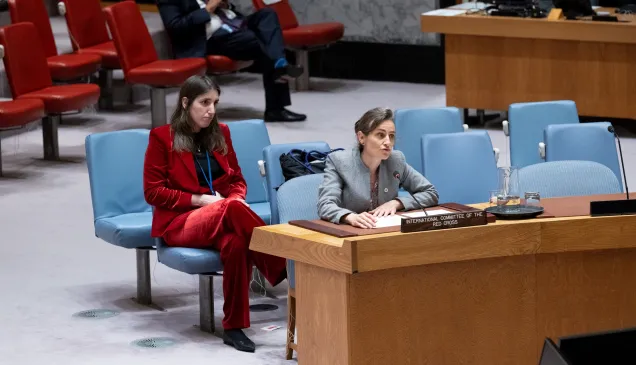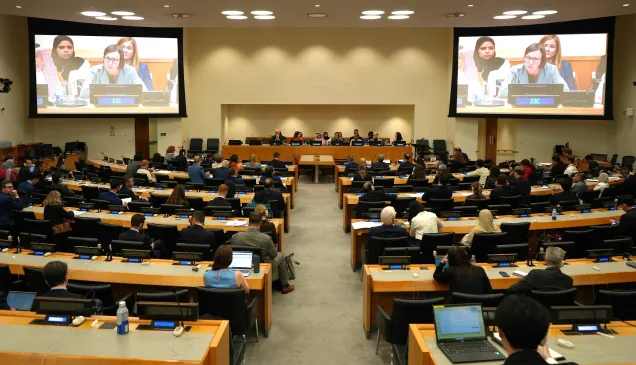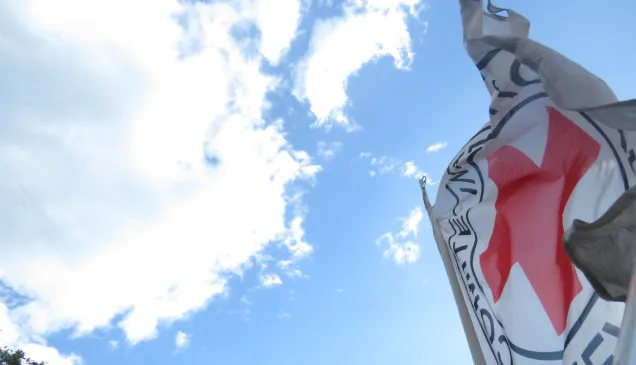As delivered by ICRC vice president Gilles Carbonnier
I wish to thank you, and all of the co-organizers, the Ambassadors of South Africa and Cote D'Ivoire, for this opportunity to address today's Arria Formula Meeting on the critical issue of displacement. This is a timely debate given the sheer numbers of displaced people across the globe: we heard Filippo Grandi, and previous speakers including yourself, chairman, providing us with staggering figures that speak for themselves. It means that one in every hundred children, women and men across the globe is displaced today as a result of armed conflict, armed violence, persecution or human rights violations. This is also a timely debate as we celebrate the 50th anniversary of the OAU Refugee Convention, and the tenth anniversary of the Kampala Convention.
Daily, in Africa and beyond, the delegates of the International Committee of the Red Cross witness the humanitarian consequences of displacement and what it means for the individuals behind the huge numbers we have heard. We at the ICRC are convinced that the Kampala Convention offers an important guide for African States to address internal displacement. And we urge all States across the Continent to ratify and implement the Kampala Convention.
Today, displacement is becoming ever more protracted which, at times, contributes to further instability and further conflict. In this context, I want to frame my remarks along the African Union's theme of the year: What can be done for Refugees, Returnees and IDPs: Towards Durable Solutions?
Let me highlight four ways in which the UN Security Council, the African Union, and States can create conditions for durable solutions:
First, it is critical to prevent violations of international humanitarian law and international human rights law. Respect for IHL and human rights can indeed greatly limit the humanitarian consequences of armed conflict and violence. It can thus prevent displacement from happening in the first place.
And for those who have been displaced, conditions for durable solutions require basic infrastructure to be restored and protected. It requires creating livelihood opportunities, which in turn depends on civilians and their assets being protected.
Second, durable solutions rest on the displaced being entitled to free and informed choice – or voluntariness. States have the primary duty and responsibility to provide durable solutions. They must establish conditions, as well as provide the means, for the displaced to build on durable solutions when returning home, or integrating in the location where they have been displaced, or resettling elsewhere.
Many IDPs and refugees prefer to return. States too often tend to see return as a solution, which can convey a sense of normalcy. However, there is no hierarchy among the different types of durable solutions. Individuals must be able to determine, in light of their specific circumstance, what they can pursue. In some instances, local integration or resettlement may offer a better durable solution than return. Local integration or resettlement can be the best temporary solution, until conditions in the place of origin allow for safe, voluntary and dignified return.
Third, national authorities should seek the effective involvement of IDPs, refugees and host communities in the design and implementation of durable solutions, with the support of humanitarian and development actors. The ICRC already supports national authorities towards durable solutions and is ready to do more.
In South Sudan for instance, last month I could witness how our teams in the field were helping displaced people to reconnect with their dispersed families across South Sudan and beyond and discuss collectively how the evolving situation changes their options, and trying to collectively identify what would be the best durable solutions for them.
Today, in some regions of Ethiopia where displacement has occurred, the ICRC is providing seeds and tools to those who have voluntarily decided to return, so that they can resume planting and growing food.
While assisting displaced people, we also provide cash assistance to allow returnees to restart economic activities upon voluntary return. In parts of Mali for example, we complement such assistance with food ration and basic household items. The overall objective is to help kick-starting durable livelihood recovery. More can be done in partnership with national authorities, private businesses and development finance institutions.
Fourth, it is important to acknowledge that, even after returning back home, displaced people often face specific issues that have to be addressed as a matter of priority. To the extent possible, States must support the recovery of property and possessions left behind upon displacement. Where not possible, national authorities should provide appropriate compensation, or assist returnees in obtaining other forms of just reparation.
Excellencies, ladies and gentlemen,
Before concluding, I wish to highlight two trends increasingly affecting displaced persons: urbanization and climate change.
Africa is urbanizing fast, and internal displacement is increasingly urban. African capitals like Addis Ababa or Nairobi host large numbers of IDPs and refugees. People flee from rural to urban areas, as witnessed for example in Baidoa, Somalia, and Maiduguri in Nigeria. Cities themselves are theatres of armed conflict and violence.
Through interviews, we have learned that one of the main protection issues in urban areas is the lack of security related to housing and land. Insecurity forces IDPs to move multiple times. This means that they lose the social networks and the access to vital services that they had been able to secure. The ensuing deprivation forces some of them to resort to harmful survival strategies, such as engaging in transactional sex or sending their young children to work. Hence, states must duly consider the socio-economic, political and legal landscape affecting the displaced in urban settings.
Internal displacement is also impacted by climate change. In many regions such as the Sahel or the Horn of Africa, the vulnerabilities of agro-pastoralists and other communities are exacerbated by the combined impact of armed conflicts and climate change. Displacements tend to heighten existing tensions and competition over scarce resources. States need to recognize the double impact of climate risks and conflict, and assist affected communities to adapt to such stresses.
To conclude,
The ICRC commends efforts to put the spotlight on durable solutions to forced displacement in Africa. In this context, we wish to stress three issues:
- First, the critical role of IHL in preventing forced displacement, and the crucial role of the African Union and the UN Security Council and its members in this regard;
- Second, the need to ensure effective participation of IDPs, refugees and host communities in the co-creation and implementation of durable solutions, with the support of humanitarian and development actors;
- And third, let us not forget that displaced people caught in the middle of armed conflict tend to face higher risks of going missing. States must take steps to prevent people from disappearing, search for those missing, and ensure that the specific needs of their families are addressed.
In sum, we have to consider the full spectrum of durable solutions to effectively address the needs of refugees, displaced persons and returnees. The ICRC remains more committed than ever to assist states in this endeavour.
I thank you for your attention.



